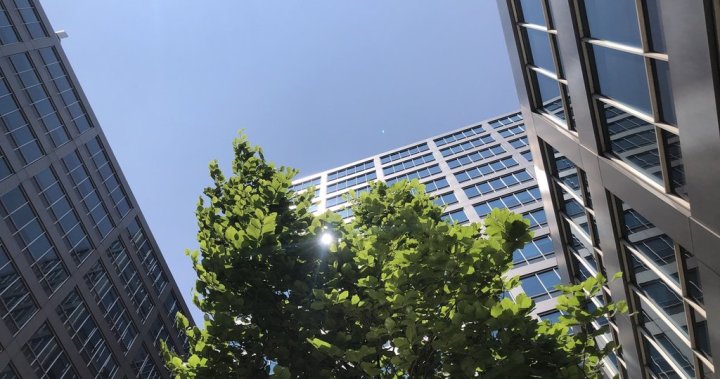A newly released report from city staff says Toronto still has the authority to mandate new buildings meet certain climate and sustainability targets, despite concerns those powers could be undercut by a recent Ontario law.
The report set to go before the city’s executive committee today says there’s “no impact” to the city’s ability to apply its green standard to new development under the recently passed Bill 17, Protect Ontario by Building Faster and Smarter Act.
Several environmental and industry groups have suggested the law may prevent municipalities from setting standards beyond what’s already required in the provincial building code.
Toronto’s green standard is considered a key plank of the city’s climate plan and is touted as a way to make new buildings more resilient to climate-fuelled extreme weather while cutting back on emissions.
Among other things, it requires new builds to retain stormwater to prevent flooding during extreme rainfall and have enough tree canopy to help stave off extreme heat. It also requires buildings to meet annual emissions targets, pushing developers to consider low-carbon heating options such as heat pumps over natural gas, and install parking spots for bikes and electric vehicles.
A spokesperson for Municipal Affairs and Housing Minister Rob Flack did not directly say whether the bill would impact Toronto’s ability to enforce the standard, but she did say it was adding to building costs and slowing down construction.

Get breaking National news
For news impacting Canada and around the world, sign up for breaking news alerts delivered directly to you when they happen.
“Our government is focused on what the economics support, setting the same rules for everyone to get shovels in the ground to build more homes faster,” Alexandra Sanita wrote in a statement.
The Atmospheric Fund, a regional agency that supports climate solutions in the Greater Toronto and Hamilton Area, has suggested green development standards may actually help accelerate development timelines by streamlining sustainability-related planning requirements into a single document with clear expectations.
In a letter to the province, it pointed to data that suggested Toronto and Pickering, two municipalities with green standards, have both seen their approval timelines improve in recent years, although they remain above the national average.
Bryan Purcell, a vice-president at The Atmospheric Fund who’s worked closely on green standards, says he was “somewhat surprised” but “very encouraged” by how definitive the city’s position was in the staff report. He says green standards are “so core” to Toronto’s climate objectives that “we can’t really afford to lose it.”
But he said the bill had generated enough confusion to possibly stall efforts by municipalities interested in pursuing their own version of the standard.
“I think the biggest immediate impact is that I expect to see some slowdown in those cities that were on the path of developing their first green standards,” he said in an interview.
The omnibus Bill 17 was rushed through the legislature and passed into law earlier this month before a public comment period closed and without further review by a legislative committee.
Changes made under the new provincial law prevent municipalities from passing bylaws respecting the construction or demolition of buildings. Some law firms and regulatory bodies, including the Ontario Association of Architects, have said that change would appear to make green standards obsolete.
Others have suggested the province may use the bill to limit what types of studies a city can require from a developer before approving a project. Toronto’s green standard, for example, requires a developer to submit an energy modelling report that outlines how the building will keep greenhouse gas emissions in check.
The OAA says green standards should not be lost, adding they help “everyone understand energy consumption in buildings,” and position Ontario to achieve its climate targets.
More than a dozen other Ontario municipalities have used Toronto as a model to come up with their own green standards. While Toronto, Halton Hills and Whitby are among those with mandatory standards, most are voluntary.
The Residential Construction Council of Ontario, a vocal critic of the standard, has suggested it’s adding to housing costs. RESCON sued Toronto over the standard last year in a case still before the courts.
President Richard Lyall called the city staff report set to be discussed Tuesday “delusional and unsubstantiated.”
“We’re going to make our views known to the committee,” he said.
© 2025 The Canadian Press
Read the full article here

